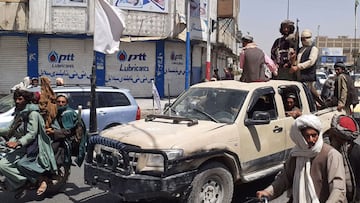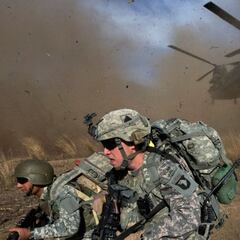What is behind the Taliban's rapid advance in Afghanistan?
The Afghan army crumbles while provincial capitals fall to the Taliban, prompting the US to send an extra 3,000 troops to assist the Kabul evacuation.


The Taliban captured Kandahar, the second-largest city in Afghanistan, this morning and are fighting over cities just 90 miles from Kabul.
Over the past seven days, the Taliban has taken control of at least 15 out of 34 provincial capitals.
— Al Jazeera English (@AJEnglish) August 13, 2021
Here are 10 maps to help you understand Afghanistan: https://t.co/XvEwQaWF9P pic.twitter.com/QdBK87mGwW
The NATO withdrawal
The latest wave of the Taliban advance comes as NATO troops are due to leave the country. US representatives in former President Donald Trump's administration signed the Doha agreement on February 29, 2020, with the Taliban. The US and its NATO allies agreed to withdraw all troops within 14 months if the militants upheld the deal. Despite attempts by the House to prevent the President from unilaterally pulling soldiers out, President Biden confirmed the withdrawal in April 2021. All US troops are due to leave by September 11 of this year. This withdrawal has emboldened the Taliban, who have been pushing against the Afghan army hard in the last few months. As part of the agreement, the Taliban agreed not to fight international troops, but are under no obligations to stop fighting the Afghan government forces. NATO has been fighting in Afghanistan since October 7, 2001.
March of the Taliban
Since the publication of our last article on Afghanistan a month ago, the Taliban has captured over a dozen provincial capitals and have their sights set on Kabul. Early Friday morning, the Taliban seized the country's second-largest city, Kandahar, the latest provincial capital to fall. The southern city of 600,000 people was once the Taliban's stronghold, and is strategically important because of its international airport, agricultural and industrial output.
The UK defense secretary Ben Wallace says he fears Afghanistan is "on the brink of a civil war", but at this stage it feels like a very one-sided struggle. Despite it being well-equipped, the Afghan army has struggled to put up any meaningful resistance due to its poor morale. Desertion has been rife, and there have been credible reports that the Afghan government is in the process of fleeing the country with the Americans.
Not only are cities falling, but even the Afghan government has also started fleeing. Reports that Afghanistan's first Vice President Amrullah Saleh has fled to Tajikistan. Even the 'famous' anti-Taliban warlord, Md Ismail Khan, has surrendered to the Taliban.
— Ashok Swain (@ashoswai) August 13, 2021
The Afghan army is supposed to have more than 300,000 soldiers on paper, as well as US support with air strikes. But these published numbers are under scrutiny, and in its latest report to the US Congress, the Special Inspector General for Afghanistan (SIGAR) expressed "serious concerns about the corrosive effects of corruption... and the questionable accuracy of data on the actual strength of the force".
Many soldiers do not have any local experience or links to areas they are posted. Afghanistan is an ethnically divided country, and the countryside is largely controlled by tribes and local warlords. Troops unfamiliar with territories are not likely to be supported by the populations living there.
Echoes of Vietnam
Afghanistan is facing one of its worst humanitarian crises in years, and tens of thousands of civilians are fleeing the fighting. More than 1,000 civilians killed in Afghanistan in the past month alone, according to the UN.
Despite the hurried evacuation of American and Afghan personnel, the State department spokesman Ned price said, this "wasn't an abandonment, this wasn't an evacuation... this is all about ensuring the safety and security of our personnel." To support the withdrawal, the US is sending an extra 3,000 troops and the UK will be supporting them. The US embassy in Kabul is urging all US citizens to leave the country immediately, and the UK gives the same warning. Embassies are being left with 'skeleton' crews to ensure diplomatic operations can still continue while NATO soldiers escort staff and the Afghans that worked with the US and the UK to Kabul airport.
There is certainly a whiff of the end of the Vietnam War in 1975. The US embassy in Saigon was besieged by people trying to flee the advancing North Vietnamese army, and a repeat of those events could be likely as the US and UK are set to defend Kabul international airport as people are evacuated to safety. Republican Senator Mitch McConnell described the situation in Afghanistan as "an even worse sequel to the humiliating fall of Saigon."
The last American contingent leaving Saigon, South Vietnam on April 30, 1975, abandoning their allies behind. pic.twitter.com/sHd29pEkIN
— Asif Luqman Qazi (@asifluqman) August 12, 2021
A troubled future for Afghanistan
A Taliban victory would be a disaster for the NATO military mission, but the effects will be felt much keener by the Afghan population. The Afghans who worked with NATO are under threat of reprisals by the Taliban, hence their evacuation.
The group that will be most affected is women and children. During the last period of Taliban rule 20 years ago, girls older than 10 were not allowed to go to school and the women were forced to conform to strict conservative Islamist rule. The Taliban have tried to present themselves in recent interviews as changed from then, but the harsh rules are likely to return. In his comments about the situation in Afghanistan, Ben Wallace said that the NATO mission was "not a failure" because it allowed the space to allow women and children access education that they previously couldn't. All these positives will mean nothing if the return of the Taliban takes these rights away from the population. If the Taliban keep up their advance, then the country could be conquered by the Autumn.
"My father was killed by Taliban fighters and so was my brother. We escaped the fighting to come here"
— BBC News (World) (@BBCWorld) August 13, 2021
The BBC's @yogital meets civilians fleeing the Taliban in Afghanistan https://t.co/1IsA6LCKFx pic.twitter.com/DP0ruU9fmD
Related stories
NATO is convening a meeting of its member states today to discuss the situation in Afghanistan, but it is to be focused on evacuation planning rather than a leap back into combat.
A failed nation-building project
The final evacuation spells the end for America's 20-year long project to rebuild Afghanistan in its own image. Similar to events in Iraq, a US installed puppet government could not defend itself against an ideologically opposed foe despite a technological and numerical advantage. Wracked by corruption and despised by its own people, there is little appetite to fight for the government. The US has seen thousands of its own soldiers deaths, tens of thousands of Afghan deaths, and trillions of dollars of money spent on what is likely to become the same status quo before fighting began. The failure could spell disaster for the Afghan people and governments around the world are worried for global security in the years ahead. Afghanistan truly is the 'graveyard of empires.'

